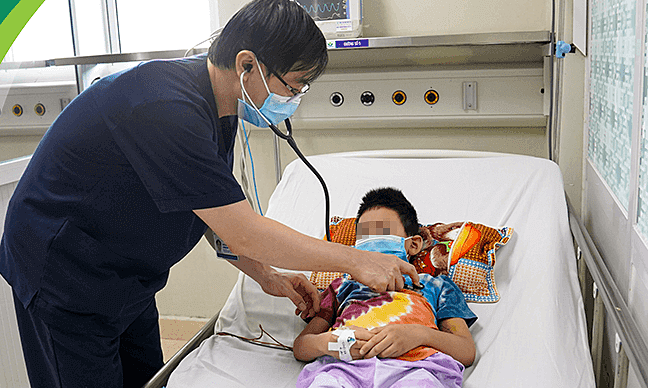Hanoi While dengue fever and pink eye epidemics are at their peak, some diseases such as hand, foot and mouth disease and chickenpox are becoming more complicated when children return to school.
In the past month, the National Children's Hospital has received about 100 children with dengue fever, a four-fold increase compared to the same period last year, including many cases of relapse. For example, an 8-year-old boy in My Dinh who had dengue fever four years ago has relapsed this time with severe symptoms such as continuous high fever, petechiae on the skin, then low blood pressure, decreased platelets, and increased liver enzymes. The child's condition worsened and he was hospitalized for two weeks before stabilizing.
Not only dengue fever, Hanoi is currently experiencing an epidemic of acute conjunctivitis, also known as pink eye. According to statistics from the Examination Department of Hanoi Eye Hospital, on average, 20-30 patients come for examination due to pink eye every day, of which 5-7 cases have severe complications. Meanwhile, at the Central Eye Hospital, the number of patients coming for examination in August increased nearly twice as much as in June.
Doctor Hoang Cuong, Central Eye Hospital, said that pink eye is a benign disease, curable, with few sequelae. However, about 10-15% experience complications such as keratitis, corneal ulcers, which often occur in people with poor health, the elderly, and children.
In addition, the Hanoi Center for Disease Control (CDC) has recorded an average of 40-50 cases of hand, foot and mouth disease per week recently. In addition, Hanoi also has nearly 2,000 cases of chickenpox, an increase of nearly 10 times compared to the same period last year. This is the time when students return to school, coinciding with the time when hand, foot and mouth disease increases sharply, creating a risk of an outbreak.

A child with dengue fever is treated at the National Children's Hospital. Photo: Tran Viet
On September 12, Associate Professor, Dr. Nguyen Thi Dieu Thuy, Head of the Department of Pediatrics, Hanoi Medical University Hospital, assessed that in the past two years, after the end of social distancing, the rate of children with infectious diseases has increased, with many severe cases recorded. On the other hand, the time of disease onset does not follow the usual rules, and the progression is longer.
Explaining this, Dr. Thuy said that this is the result of "immune debt", leaving a large gap that has not been "compensated". Therefore, when the immune system "collides" with "familiar" viruses and bacteria such as hand, foot and mouth disease, chickenpox, dengue fever..., it causes children to have many strong reactions, high fever, and more severe symptoms.
Normally, when exposed to bacteria and viruses, it is also an opportunity for the child's immune system to increase its activity, producing antibodies against pathogens. Immune debt is a phenomenon that occurs when children are not exposed to bacteria and viruses on a regular basis.
"At the beginning of the school year, children are prone to getting sick a lot because they are on summer vacation for 2-3 months in a row and do not come into contact with crowded places. When they return to school, they are more likely to get sick," said Dr. Thuy.
Therefore, experts recommend that parents need to double their resistance to promptly compensate for the gap in their children's immunity with a nutritional regimen that ensures adequate intake of the four food groups: protein, carbohydrates, fat and fiber. Increase foods rich in zinc and iron found in beef, shrimp, crab, animal liver and foods rich in vitamins A, C, E... such as oranges, tangerines, grapefruits, and green vegetables.
Children under 5 years old, especially from 6 months to 2 years old, are at high risk of lacking the micronutrients zinc and iron, especially lacking together, so parents need to pay attention to proactively supplementing zinc and iron to meet their needs. Note that micronutrient supplementation should last for several weeks to several months, regularly, at least until the child's immune system is complete.
In addition, it is necessary to ensure a clean and airy living environment. Absolutely do not smoke, especially in families with small children. Teach children to practice personal hygiene, go to bed early and get enough sleep. Increase the time and frequency of outdoor play and exercise to give the immune system a chance to develop.
Le Nga
Source link






























![[Photo] National Assembly Chairman attends the seminar "Building and operating an international financial center and recommendations for Vietnam"](https://vphoto.vietnam.vn/thumb/1200x675/vietnam/resource/IMAGE/2025/7/28/76393436936e457db31ec84433289f72)






































































Comment (0)